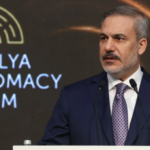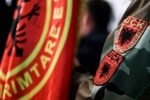The European Union’s Special Representative for the Kosovo-Serbia dialogue, Miroslav Lajčák, doesn’t have much time left in his role. With the election of a new EU government, he is expected to be replaced. Despite this, Lajčák has been continuously active, as seen in his social media posts, where the central theme of every meeting or event is the dialogue between Kosovo and Serbia. However, no positive results have been seen in this area, and the Slovak envoy has not been particularly notable for his work in these negotiations.
Recently, in Madrid, Lajčák discussed the dialogue and other Western Balkan issues with Fernando Mariano Sampedro Marcos, the Spanish Minister for Europe. This meeting followed over 7 hours of negotiations in Brussels between the chief negotiators of Kosovo and Serbia, discussing normalization agreements, implementation annexes, war missing persons, and an energy agreement.
Political analysts expressed pessimism about Lajčák’s recent efforts, criticizing both his and Borrell’s approach to the Kosovo-Serbia talks. Amir Shabani, a diplomatic relations expert, criticized Lajčák and Borrell for their limited contributions, highlighting that both come from countries that do not recognize Kosovo’s independence (Slovakia and Spain).
Shabani was particularly harsh on Lajčák, accusing him of tolerating Serbia’s actions and failing to address crimes and conflicts caused by Serbia in Kosovo. Shabani hopes that the new EU Foreign Policy Chief, Kaja Kallas, who has a positive relationship with Kosovo, might bring progress to the dialogue.
Visar Xani, a political affairs expert, suggested that Lajčák’s recent visits are merely to wrap up his agenda. He does not expect any significant improvement or results from these visits due to the passive dynamics of diplomacy, considering the upcoming elections in the EU and the US. Xani believes that changes in political figures within the EU could also lead to changes in the dialogue agenda. He noted that Lajčák’s visits to non-recognizing states might be to soften their stance towards Kosovo’s reality and independence.
Key Points:
- Miroslav Lajčák’s tenure as the EU’s Special Representative for the Kosovo-Serbia dialogue is nearing its end.
- Despite his active presence, there have been no positive results in the dialogue.
- Recent discussions in Madrid and Brussels covered various important topics but yielded no significant progress.
- Analysts criticize Lajčák and Borrell’s approaches, given their countries’ non-recognition of Kosovo.
- Optimism rests on the new EU Foreign Policy Chief, Kaja Kallas, for potential progress in the dialogue.







